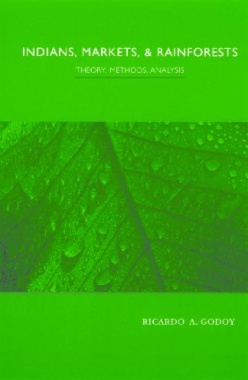This book addresses two important and related questions: does participation in a market economy help or hurt indigenous peoples and how does it affect the conservation of tropical rainforest flora and fauna? Oddly, there have been few quantitative studies that have addressed these issues.
Ricardo Godoy's research takes an important step toward rectifying this oversight by investigating five different lowland Amerindian societies of tropical Latin America—all of which are experiencing deep changes as they modernize. Godoy examines the effect of markets on a broad range of areas including health, conservation of flora and fauna, leisure, folk knowledge, reciprocity, and private time preference. He concludes that, contrary to considerable anthropological theory, the effect of markets on the quality of life and the rainforest are often unclear or benign. Godoy uses multivariate techniques to examine the changes modernization has had on many indicators of the quality of life and the environment and concludes that the seeds of socioeconomic differentiation may already lie dormant in simple economies.
The impact of modernization on lowland Amerindians is a topic of great concern to anthropologists, researchers, and policymakers in developing nations, and this book is a significant contribution to the debate about the likely future of indigenous people.
- Quote
- [ Contents ]
- Introduction
- Acknowledgments
- [ Part I ] THE QUESTION,THE RESEARCH DESIGN, AND THE PEOPLE
- Chapter 1: The Question and Its Significance
- Chapter 2: Comparing Approaches
- The Approach of Development Economists
- The Approach of Political Economists
- The Anthropological Approach
- The Model of Gross and Colleagues
- A Ricardian Model of Trade
- Conclusion
- Chapter 3: Research Design
- Definitions, Causality, and Functional Form
- Rationale for the Choice of Cultures
- Methods Used to Collect Information
- Sumu-Mayagna (Nicaragua) and Tawahka (Honduras)
- Mojeño and Yuracaré (Bolivia)
- Tsimane´ (Bolivia)
- Chiquitano (Bolivia)
- Quality of Information
- Sampling
- Conclusion
- Chapter 4: Ethnographic Sketches
- Tawahka
- Tsimane´
- Mojeño and Yuracaré
- Chiquitano
- Similarities and Differences
- Conclusion
- [ Part II ] THE FINDINGS
- Chapter 5: Forest Clearance: Income, Technology, and Private Time Preference
- Rationale for the Choice of Indigenous People and of Old-Growth Forest to Study Deforestation
- The Model
- Hypotheses
- Previous Studies
- Variables
- Results
- Hypotheses 1-3: Forest Clearance and Income
- Hypothesis 4: Forest Clearance and Crop Yields
- Hypothesis 5: Forest Clearance and Private Time Preference
- Sensitivity Analysis and Controlling for Reverse Causality
- Conclusion
- Chapter 6: Game Consumption, Income, and Prices: Empirical Estimates and Implications for Conservation
- The Role of Income and Prices in Game Consumption: Implications for Conservation
- Goals, Variables, and Econometric Models
- Results
- Comparing Availability of Game in Richand Poor Communities
- Conclusion
- Chapter 7: Chayanov and Netting: When Does Demography Matter?
- When Does Demography Matter?
- Goals and Econometric Approach
- Results
- Does Demography Matter After Controlling for Distance from Village to Town?
- Comparison of Autarkic and Non-Autarkic Households: Pooled Sample
- Comparison of Autarkic and Non-Autarkic Households: Results by Ethnic Group
- Conclusion
- Chapter 8: Chayanov and Sahlins on Work and Leisure
- Cross-Cultural Evidence and Theory
- Goals
- Econometric Approach
- Potential Endogeneity and Fixed Effects
- Results
- Conclusion
- Chapter 9: Human Health:Does It Worsen with Markets?
- The Three Positions in the Debate
- Reasons for Divergent Views
- Hypotheses
- Definition and Measurement of Variables
- Econometric Models, Endogeneity, and Comparing Different Metrics
- The Limits of Bivariate Analysis: A Detour and Example
- Results of Multivariate Analysis
- Conclusion
- The Debate
- Chapter 10: Mishaps, Savings, and Reciprocity
- Definition, Measurement, and Estimation
- The Approach of Evolutionary Ecologists
- A New Approach to Reciprocity
- A Reduced-Form, Unrestricted Model of Savings
- Ethnographic Context of Misfortunes and Coping Mechanisms
- Savings in Domesticated Animals and Misfortunes
- Definition and Measurement of Variables
- Results
- Markets and Reciprocity
- Saving Out of Transitory or Permanent Income
- Conclusion
- Chapter 11: Trade and Cognition: On the Growth and Loss of Knowledge
- A Ricardian Trade Model and the Loss of Knowledge
- Econometric Model
- Methods
- Test of Knowledge
- Household Socioeconomic and Demographic Surveys
- The Variables: Definition and Measurement
- Specialization
- Conclusion
- Chapter 12: Time Preference, Markets, and the Evolution of Social Inequality
- Delay of Gratification Among the Tsimane´
- The Determinants of Time Preferences: Tsimane´ and Western Views
- Methods and Variables
- The Measurement of Time Preference and The Rationale for Using Food
- Information and Econometric Model
- Results
- A Hypothesis About Time Preference and Occupational Choice
- Conclusion
- [ Part III ] WHAT WE HAVE LEARNED
- Chapter 13: CONCLUSIONS
- Contribution to Anthropological Theory
- Contribution to Anthropological Methods
- Knowledge and Public Policy
- Appendix: Test of Folk Knowledge
- References
- Index

